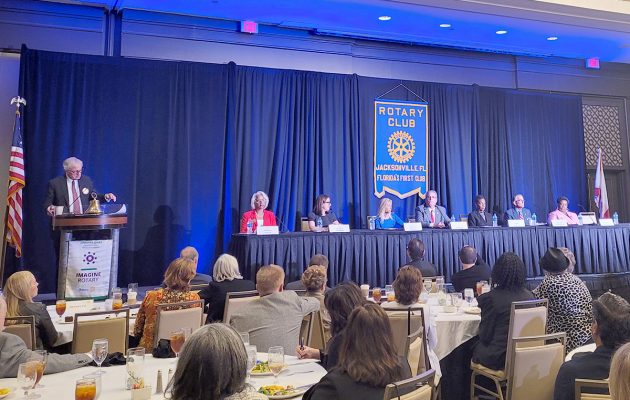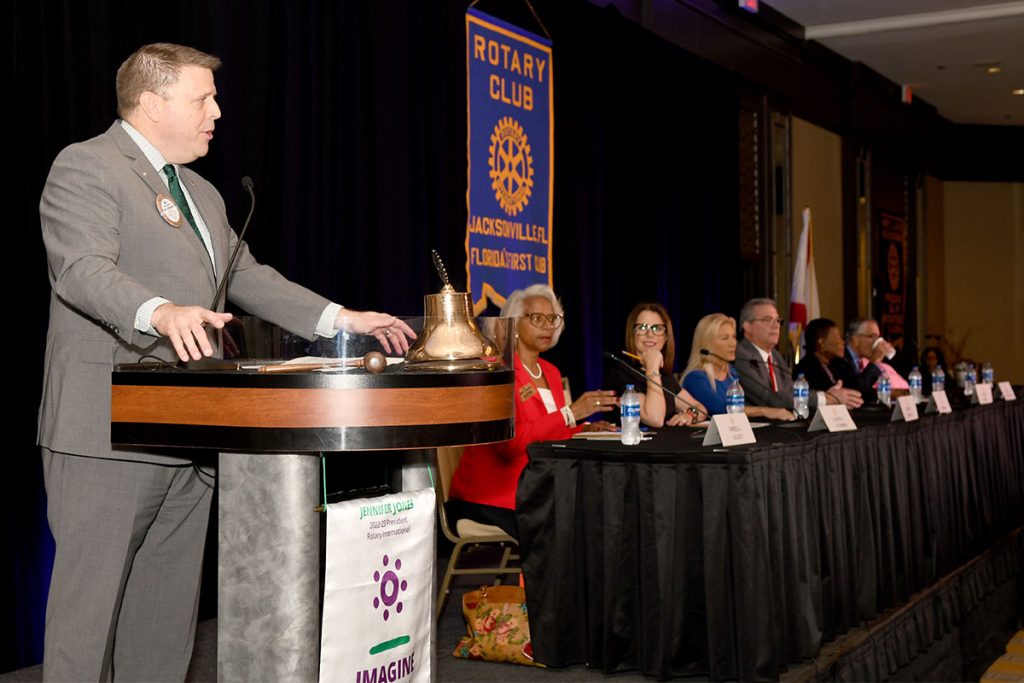Candidates emphasize need for change at first mayoral debate
Posted on December 1, 2022 By Editor Top Stories

A desire for change was the common message shared by all the mayoral candidates at the Nov. 21 debate hosted by the Rotary Club of Jacksonville.
Held at the Jacksonville Marriott Downtown, the event offered candidates an opportunity to share their perspectives on an array of issues, including education, crime, economic development and management of the St. Johns River.
Stemming crime
On crime, most candidates agreed that a proactive approach was best, stressing the importance of maintaining a positive relationship between the sheriff’s office and the public.
“I think it’s very important for the mayor’s office to set the example and to work with the sheriff’s office,” Democrat and former First Coast News anchor Donna Deegan said. “And I think it’s very, very important to open some lines of communication that have, frankly, been closed off for too long.”
Likewise, Republican City Councilman Al Ferraro and Democratic state Sen. Audrey Gibson echoed that sentiment, with the latter highlighting her degree in criminology and suggesting that officers police the areas where they are best known to residents.
Meanwhile, on the matter of funding, Republican City Councilwoman LeAnna Cumber and Deegan both said they supported fully funding the sheriff’s office, while Omega Allen, a general contractor who is running unaffiliated, said she felt some funds may need to be reallocated to ensure they were being used efficiently.
Development and the river
When it came to economic development, Gibson said her focus as mayor would be on small businesses throughout the city.
“When the neighborhoods are thriving, when crime is low, when we have livable communities, everybody will want to bring their business to Jacksonville,” she contended.
However, many candidates expressed that a change was specifically needed downtown.
“Downtown is the heart of every major city,” Allen said. “Jacksonville has heart trouble and it’s in need of a transplant.”
Outlining a need for “residential, retail, entertainment and reliable transportation,” she added, “When we establish those things … Jacksonville will become the city we all hoped it would be.”
Further, candidates on both sides of the aisle agreed that the St. Johns River is a resource the city has yet to take advantage of from a development standpoint.
“We have this amazing asset with dolphins and manatees and nobody uses it,” Cumber noted. “And that is one of the biggest problems. We need to start giving people choices to boat to on the river.”
Likewise, Deegan agreed that increased access to the river is needed, but cautioned, “We’re not going to have those dolphins and manatees in our river forever if we don’t start taking better care of it, so that’s priority number one.”
Another concern she raised was flooding and the need for fortifications to protect against rising waters.
Sharing in that concern were Ferraro — whose district is split by the river — and Democrat Theresa Ann Richardson, who said that as mayor, she would appoint a committee to address flooding and other issues associated with Jacksonville’s waterways.
“That’s our big seller — our water,” she said. “That’s what’s going to attract businesses to come here.”

Education
The issue on which the candidates differed most was education.
Republican candidate Frank Keasler Jr., who said he would like to create a program to teach students that they were “created with a purpose,” noted, “I know from living here 50 years, the mayor’s program is usually the way that the [school] board goes, or at least there’s clear ear of the board to the mayor’s voice.”
Others, however, said they would defer to and support the vision of the school board and superintendent.
“I think the biggest thing that you can do from the mayor’s office for our public schools is to support our duly elected school board,” Deegan said. “I don’t think we see too much of that right now, and I would like to see our mayor’s office support what our schools’ superintendent is trying to do with our schools. And frankly, I think she’s done a fantastic job given everything that she’s had as challenges over the past several years.”
While Allen seemed to agree with that perspective, it was not shared by Cumber, who said: “Our school system’s failing our kids. Our reading scores have gone from 60 to 47% in six years.”
Holding that the mayor has a responsibility to ensure the city’s students are properly educated, Cumber added, “We need to get back to basics and get these literacy rates up in this city.”
Meanwhile, Richardson and Gibson both expressed support for an increase in teachers’ pay, with Gibson noting that the mayor could serve as an advocate for teachers with legislators in Tallahassee.
The state senator also referenced the DeSantis administration’s recent crackdown on the presence of critical race theory in state textbooks, holding that those policies have adversely affected the teaching of history in public schools.
On the other hand, Ferraro stressed that supporting parental rights and promoting the “traditional teaching” of necessary life skills — like balancing a checkbook — were the way forward.
A noted absence
One fact that loomed large over the event was that Republican Daniel Davis and independent Darcy Richardson declined to participate. Davis is also a member of the Rotary Club of Jacksonville, the Club that hosted the event.
In her closing remarks, Cumber addressed the elephant not in the room, stating, “Let’s be honest and let’s talk about who’s not here today: Daniel Davis.”
Davis, a former city councilman and state representative, entered the race in September after months of speculation.
Describing Davis as a “career politician,” Cumber charged: “He thinks he’s already won. That’s why Daniel’s not here, because he thinks it’s owed to him. I disagree, and I think he is easy to beat if we all get together.”
And on that last point, she may be right.
According to an Oct. 31 University of North Florida Public Opinion Research Lab poll, 45% of registered, likely voters said they had yet to choose a candidate, of which 53% were Republicans.
Further, while Deegan led the pack in that survey at 22%, support among the next three candidates was fairly even, with Davis at 7% and Cumber and Gibson tied at 6%.
Jacksonville’s mayoral election will be held on March 23. To avoid a run-off, one candidate must receive a majority of the vote, but if the UNF poll’s results are any indicator, it seems the mayor’s office is still very much up for grabs.
By Samantha Flom
Resident Community News




 (No Ratings Yet)
(No Ratings Yet)Al Ferraro, Audrey Gibson, Daniel Davis, Darcy G Richardson, Donna Deegan, Frank Keasler Jr, Jacksonville Marriott Downtown, LeAnna Cumber, Omega Allen, Rotary Club of Jacksonville, Theresa Ann Richardson





